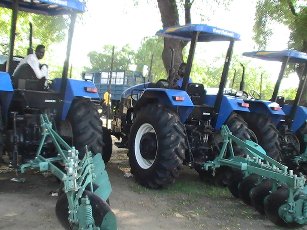Jonglei prioritises farming to reduce food insecurity
June 27, 2016 (BOR) – A number of humanitarian agencies are currently supporting large numbers of South Sudanese returnees to engage in food production in Jonglei state.

The commissioner of Twic East county, Dau Akoi, said his administration had earlier threatened to restrict humanitarian support for people considered to be idle.
“In April, I told everyone in the county to cultivate. People who were relying on food aid where warned not to receive any assistance from NGOs [Non-Governmental Organisations] if they don’t cultivate. This worked well, and now everyone has a good and healthy farm”, said Akoi.
The mid-December 2015 outbreak of conflict displaced thousands of Jonglei’s population.
Majority of people also lost homes destroyed during the over 20 months of conflict.
The commissioner anticipates that this year’s cultivation will be the first best for food production, if all goes as planned.
Akoi said Catholic Relief Service (CRS), which was funded by the United States aid arm (USAID) announced the closure of the Jonglei Food Security Program (JFSP), which was the lifeline for many people in the entire state since August 2011.
“So to narrow the food insecurity gap, the state government encouraged the people to cultivate”, he further stressed.
At the start of last month, Bor and Duk counties experienced insufficient rainfall. Many farmers had not yet planted and some, who did do, witnessed poor germination.
This is likely to create imbalances in the level of food production in the populous state.
Paul Angeth, a farmer who owns a large farm in Bor, said half of his farm, in which he planted maize, has been destroyed by drought, while the sorghum field was better.
“I planted in the last week of May. The maize farm was destroyed by drought while in the sorghum section, the few that germinated are now improving. If we had a local expert who would be informing us about daily weather conditions, we would know when to plant,” said Angeth.
“The climate has changed, rains are now coming in June, two months late than what we used to know, which a real problem is,” he added.
A source at the state agriculture ministry said the state-owned farm, that covers more than 1,000 hectares of land, currently has low crop population below expected levels.
(ST)
